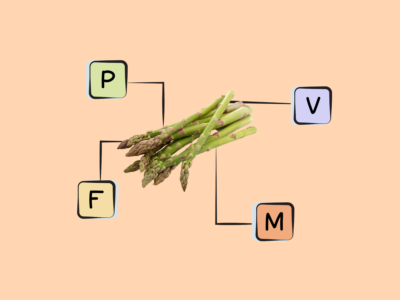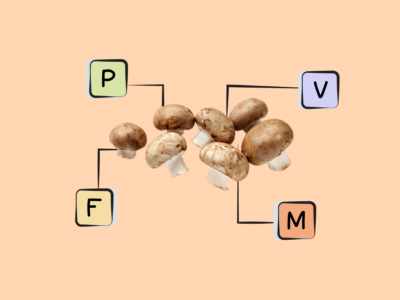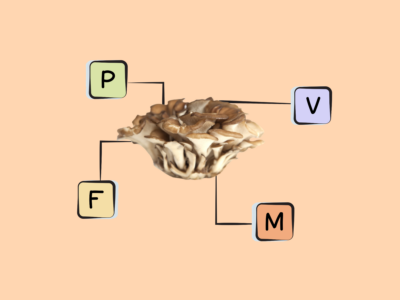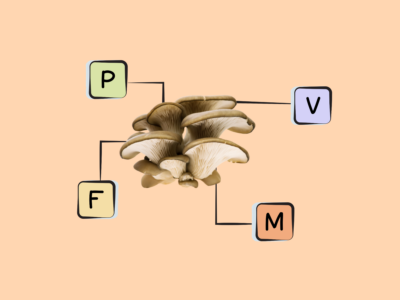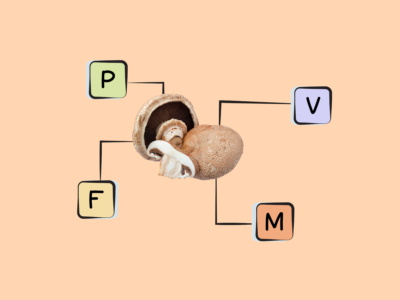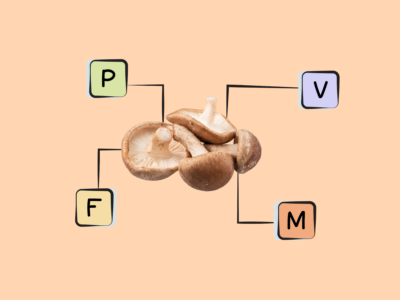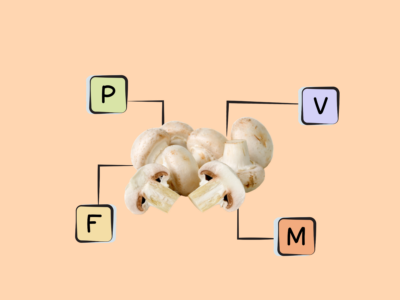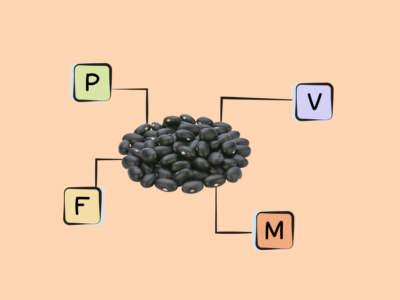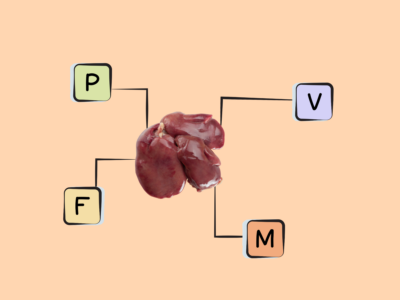Key Takeaways (expand)
- Ergothioneine is a non-proteinogenic amino acid derived exclusively from our diet.
- This nutrient serves as a powerful antioxidant, directly scavenging for free radicals including reactive oxygen species and reactive nitrogen species.
- Ergothioneine also helps activate antioxidation enzymes and regulate cellular antioxidant defense systems.
- Ergothioneine has several unique properties, including the ability to chelate metal (binding to copper, zinc, mercury, cobalt, cadmium, nickel, and iron cations) and protecting cells from UV radiation damage.
- Through the action of a transporter called SLC22A4 (formerly OCTN1), ergothioneine accumulates in bone marrow, red blood cells, kidneys, skin cells, liver, seminal fluid, cerebellum, spinal cord, and eyes.
- Ergothioneine tends to accumulate most readily in abnormal tissues, during inflammatory states, and during the repair of damaged cells—making it extremely targeted in terms of its activities!
- Ergothioneine may also impact immunity by reducing oxidative stress within immune cells.
- Higher dietary intake of ergothioneine, as well as higher blood levels of ergothioneine, are strongly associated with longer lifespan.
- Ergothioneine is also extremely cardioprotective: its antioxidant and anti-inflammatory activities interfere with atherosclerosis, and protect the cardiovascular system from oxidative damage.
- Some evidence also suggests ergothioneine could help protect against damage and complications from type 2 diabetes.
- Research shows wide-ranging neuroprotective activities of ergothioneine, including combating oxidative stress, inducing neurogenesis, promoting neuronal maturation, inducing neurotrophic factors, reducing inflammation, and protecting against various neurotoxins.
- Higher levels of ergothioneine are associated with reduced risk of dementia, cognitive impairment, and some neurodegenerative diseases like Parkinson’s.
- Ergothioneine could help reduce the risk of the pregnancy complication preeclampsia.
- Some research also suggests potential benefit of ergothioneine on ulcerative colitis, macular degeneration, cataracts, infection risk in early life, joint health, skin health, and sleep problems.
- In humans, blood levels of ergothioneine tend to decline after age 60, and this drop-off is associated with several age-related diseases.
- Mushrooms are the best dietary sources of ergothioneine, particularly shiitake, enoki, maitake, and oyster.
Table of Contents[Hide][Show]
- The Biological Roles of Ergothioneine
Ergothioneine in Health and Disease+−
- Ergothioneine and All-Cause Mortality
- Ergothioneine and Cardiovascular Disease
- Ergothioneine and Type 2 Diabetes
- Ergothioneine, Cognitive Function, and Neurodegenerative Diseases
- Ergothioneine and Ulcerative Colitis
- Ergothioneine and Preeclampsia
- Ergothioneine and Eye Health
- Ergothioneine and Early-Life Infection
- Ergothioneine and Joint Health
- Ergothioneine and Skin Health
- Ergothioneine and Sleep Problems
- Health Effects of Ergothioneine Deficiency
- How Much Ergothioneine Do We Need?
- Best Food Sources of Ergothioneine
- Good Food Sources of Ergothioneine
Ergothioneine is a water soluble, non-proteinogenic amino acid derived exclusively from our diet. It was first discovered by French chemist Charles Tanret in 1909, who purified it from the ergot fungus (hence the name, ergothioneine!). Due to substantial research linking it to reduced mortality, it’s been nicknamed the “longevity vitamin.”
In general, ergothioneine serves as a multifaceted protective molecule that helps maintain cellular health, especially in environments subjected to high oxidative stress. It has powerful antioxidant, anti-inflammatory, and detoxification properties shown to combat diseases associated with aging. And, it has an ability to absorb ultraviolet light—giving it a role in preventing DNA damage associated with UV exposure! Research suggests it can help protect against cardiovascular disease, diabetes, preeclampsia, neurodegenerative disease, ulcerative colitis, eye problems, and even sleep issues.
Mushrooms are our very best dietary sources of ergothioneine, accounting for about 95% of our total dietary intake. And while all mushrooms contain this nutrient, the highest amounts are found in shiitake (24.4 mg per cup), enoki (19.4 mg per cup), maitake (12.2 mg per cup), and oyster (11.3 mg per cup). Tempeh and some lacto-fermented foods also contain ergothioneine, and this nutrient has been detected in some other foods as well, due to soil-borne fungi passing it on to plants.
The Biological Roles of Ergothioneine
Ergothioneine is a derivative of histidine, and is synthesized exclusively by certain microorganisms—most notably the bacteria Actinomycetales, Mycobacteria, and Cyanobacteria (also known as blue-green algae), as well as the non-yeast fungi Neuropora crassa. While it’s indeed an amino acid, ergothioneine is non-proteinogenic, meaning it doesn’t get encoded into our DNA or incorporated into proteins. In humans, blood levels of ergothioneine tend to decline after age 60.
Ergothioneine accumulates within tissues through the action of an organic cation transporter called SLC22A4 (formerly called OCTN1). Most notably, it accumulates in red blood cells (erythrocytes), bone marrow, kidneys, liver, seminal fluid, cerebellum, spinal cord, and eyes. Although more research is needed, some evidence suggests that genetic variations within the SLC22A4 gene may influence a person’s tissue concentrations of ergothioneine. The ergothioneine transporter is also expressed in most skin cells, allowing ergothioneine to transport and accumulate throughout the skin as well. Studies have also confirmed that ergothioneine is directly taken up by mitochondria, even in the absence of the SLC22A4 transporter—suggesting there may be additional transporters that facilitate ergothioneine uptake. And, an ATP-binding cassette (ABC) transporter specific for ergothioneine was recently discovered in gastrointestinal microbes, meaning our gut bugs can take up this nutrient, too!
Due to its unique transport mechanisms, ergothioneine tends to accumulate and distribute at disproportionately higher levels in abnormal tissues, during inflammatory states, and during the repair of damaged cells. Evidence suggests this nutrient serves its most important functions under conditions of oxidative stress. As a result, the protective effects of ergothioneine are very specific and targeted, making it truly unique among the antioxidants!
Structurally, ergothioneine is a tautomer—that is, a compound that exists in two or more readily interconvertible forms (in this case, both thione and thiol forms). The conversion between these forms occurs due to the shift of a proton and the movement of the double bond between sulfur and nitrogen, which rearranges the bonding pattern of the molecule. The ability to shift between these forms allows ergothioneine to have different chemical and biological properties in different environments. This flexibility also contributes to its diverse biochemical roles!
Ergothioneine has a somewhat unusual quality of existing primarily in its thione form when at physiological pH, as well as possessing very high redox potential. Due to these properties, ergothioneine is much more resistant to auto-oxidation than other thiols (such as glutathione). Ergothioneine may also play a role in redox signaling, a process where cells use oxidation-reduction reactions to transmit signals and maintain cellular homeostasis.
Given the above, it may not be surprising that one of ergothioneine’s most important roles is as an antioxidant, directly scavenging a wide range of free radicals. These including reactive oxygen species (such as superoxide radicals and hydroxyl radicals) and reactive nitrogen species (such as peroxynitrite). As a result, ergothioneine helps prevent these molecules from causing lipid peroxidation and oxidative damage to DNA and proteins. This includes protecting the heart from reactive oxygen and nitrogen species, which can oxidize myoglobin (an oxygen-storing protein found in heart tissue) into ferryl myoglobin (which is toxic to cells). Ergothioneine also helps activate antioxidation enzymes by serving as a regulator of cellular antioxidant defense systems.
Within the cardiovascular system, ergothioneine plays numerous protective roles. It’s taken up by endothelial cells, where it helps limit the production of (and damage from) reactive oxygen species; it decreases the expression of adhesion molecules; it reduces the adhesion of monocytes to aortic endothelial cells (an important step in the development of atherosclerosis), and it reduces damage of endothelial cells exposed to hyperglycemic conditions.
One of ergothioneine’s more unique features is its metal chelation properties. Specifically, it binds to copper, zinc, mercury, cobalt, cadmium, nickel, and iron cations, reducing their potential to catalyze harmful oxidative reactions. For example, ergothioneine has been shown to protect DNA from copper-induced oxidative damage by forming ergothioneine-copper complexes that are redox-inactive (meaning they’re unable to participate in redox reactions). Ergothioneine can also selectively inhibit the activity of copper- and zinc-dependent metalloenzymes, in turn inhibiting the oxidation of these metal ions—once again preventing them from participating in the formation of reactive oxygen species.
Ergothioneine also has powerful cytoprotective activity, protecting cells from damage caused by environmental stressors such as UV radiation, toxins, and chemicals. Its UV radiation-protective properties are particularly noteworthy: ergothioneine can directly absorb light in the UV range, as well as enable the repair of DNA within UV-irradiated cells. In studies, ergothioneine has been shown to attenuate UVA-induced reactive oxygen species, mitochondrial dysfunction, DNA strand breaks, DNA fragmentation, and apoptosis (programmed cell death), mainly by activating the Nrf2/ARE signaling pathway and triggering antioxidant genes.
Ergothioneine may also impact immunity by reducing oxidative stress within immune cells, in turn enhancing their ability to respond to infections and other challenges.
Ditch Diets. Embrace Nutrients. Start with this FREE Guide.
Sign up for the free Nutrivore Newsletter, your weekly, science-backed guide to improving health through nutrient-rich foods — without dieting harder —and get the Beginner’s Guide to Nutrivore delivered straight to your inbox!

Ergothioneine in Health and Disease
As we might expect from a nutrient nicknamed the “longevity vitamin,” ergothioneine is associated with longer lifespan. But, that’s just the tip of the iceberg! Research shows that ergothioneine could also benefit a number of chronic diseases (including cardiometabolic diseases and neurodegenerative diseases), ulcerative colitis, preeclampsia, eye health, sleep, and more.
Ergothioneine and All-Cause Mortality
Studies show that ergothioneine reduces all-cause mortality and is associated with longer lifespan. For example, a 2020 study that followed 3236 health-conscious people for over two decades found that out of 112 different metabolites in their blood, ergothioneine was the dominant predictor of all-cause mortality. More specifically, the higher the blood levels, the lower the risk of cardiovascular disease and death! Similarly, another 2020 study showed that lower dietary intake of ergothioneine in America compared to four European countries correlated strongly with shorter average lifespan.
Ergothioneine and Cardiovascular Disease
Ergothioneine has strong evidence of being cardio-protective! A 2020 prospective cohort study found that over the course of follow-up (median time of 21.4 years), each standard deviation increment of blood ergothioneine was associated with a 20% lower risk of coronary artery disease, a 14% lower risk of stroke, and a 24% lower risk of death from cardiovascular causes.
In animal and in vitro studies, ergothioneine has been shown to play a role in preserving nitric oxide-dependent endothelial function (supporting healthy blood flow), protecting the brain from myocardial infarction (heart attack) damage, and protecting the brain against ischemia (stroke) damage—specifically, reducing the volume of dead tissue and protecting against neuronal injury. Some experiments also indicate that ergothioneine, either on its own or in combination with other compounds, could impact the early stages of atherosclerosis by reducing LDL oxidation, preventing the adhesion of monocytes to endothelial cells, and mitigating processes involved in foam cell formation.
Overall, there’s compelling evidence that ergothioneine’s antioxidant and anti-inflammatory activities interfere with atherosclerosis and protect endothelial cells from oxidative damage!
Ergothioneine and Type 2 Diabetes
Although more research is needed to understand the potential anti-diabetic effects of ergothioneine, the evidence so far points in a very favorable direction! In fact, a number of studies suggest ergothioneine may help protect against damage and complications from type 2 diabetes.
In a 2016 retrospective study of adults with pre-diabetes and at least two confirmed metabolic syndrome criteria, daily consumption of 100 g of white button mushrooms (supplying about 3.2 mg of ergothioneine) for a period of 16 weeks led to significant anti-inflammatory and antioxidant health benefits. These included decreases in oxidative stress, increases in the antioxidant marker ORAC (oxygen radical absorption capacity), increases in the anti-inflammatory hormone adiponectin, and decreases in the oxidative stress-inducing factors methylglyoxal and carboxymethyllysine.
Animal studies suggest ergothioneine could help protect against some complications associated with diabetes, including liver injury and kidney dysfunction. Additionally, in animal models and in vitro experiments, ergothioneine helps alleviate endothelial dysfunction induced by high blood sugar—suggesting this nutrient could help prevent cardiovascular complications associated with diabetes.
Ergothioneine, Cognitive Function, and Neurodegenerative Diseases
Ergothioneine has wide-ranging effects on the brain, with benefits for cognitive function and neurodegenerative diseases. These neuroprotective effects may be due to ergothioneine’s role in combating oxidative stress, inducing neurogenesis, promoting neuron maturation, inducing neurotrophic factors, reducing inflammation, and protecting against various neurotoxins!
In a 2021 cross-sectional study of 496 participants, blood levels of ergothioneine were lowest in patients with dementia, while patients with cognitive impairment also had lower levels compared to those who were cognitively healthy. In this study, lower ergothioneine levels were also associated with brain atrophy markers and white matter hyperintensities. A 2016 study similarly found that compared with age-matched controls, people with cognitive impairment had significantly lower plasma ergothioneine levels. And, another 2016 study found that people with Parkinson’s disease had significantly different metabolomic profiles compared to age-matched controls, including having much lower blood levels of ergothioneine.
Although controlled trials of ergothioneine consumption on cognitive health are more limited, a 2020 randomized, placebo-controlled, double-blind trial of 52 adults found that supplementing with 5 mg of ergothioneine daily led to significant improvements in cognitive function, both in normal participants and those with mild cognitive impairment. Specifically, compared to placebo, the ergothioneine supplement improved scores for verbal memory, composite memory, working memory, reaction time, psychomotor speed, complex attention, and sustained attention.
Several studies have also linked ergothioneine-rich mushroom consumption to reduced cognitive decline. In a 2022 analysis of prospective cohort data, participants in the highest category of mushroom intake (13.4 g daily on average) had significantly better scores on cognitive tests, compared to participants with the lowest intakes. And, a 2019 community-based cross-sectional study of 663 older adults found that compared to participants who consumed mushrooms less than once per week, those who consumed over two portions per week had a whopping 57% lower risk of mild cognitive impairment. While we can’t be sure these effects were entirely due to ergothioneine (versus the many other beneficial compounds in mushrooms), given the known neuroprotective effects of ergothioneine, it likely played a role!
Lastly, animal models have shown that ergothioneine improves several features of Alzheimer’s disease, including increasing amyloid beta clearance, reducing oxidative stress, and restoring glucose metabolism. More research in humans is needed on this topic!
Ergothioneine and Ulcerative Colitis
Although the research is still preliminary, some evidence suggests ergothioneine could be beneficial for inflammatory bowel diseases, particularly ulcerative colitis. In animal models of ulcerative colitis, ergothioneine administration protects against weight loss and colon shortening, reduces disease activity index scores, downregulates populations of CD4+ T cells and macrophages (indicating immune response stabilization), downregulates the expression of pro-inflammatory mediators, and alleviates gut barrier damage—chiefly by enhancing tight-junction protein expression and helping preserve the gut mucus layer. Clinical trials are needed to confirm these effects in humans!
Ergothioneine and Preeclampsia
Ergothioneine could help protect against preeclampsia—a high blood pressure condition that can occur during pregnancy.
A 2023 study of 432 first-time mothers found that higher blood levels of ergothioneine were extremely protective against preeclampsia. In fact, only one out of the 97 women above the 90th percentile of the reference range in the control population developed preeclampsia, compared to 24.2% of the women whose ergothioneine levels were below this threshold! Another analysis of the data further showed a nonlinear relationship between ergothioneine levels and preeclampsia risk, with its protective effects beginning at 300 ng/mL.
Although more research in humans is needed (especially controlled trials), animal models have confirmed that ergothioneine supplementation reduces a number of biological features of preeclampsia. Specifically, ergothioneine has been shown to reduce blood pressure levels, prevent fetal growth restriction, suppress the production of the damaging substances released from the placenta (which play a major role in the development of preeclampsia), and reduce mitochondrial-derived oxidative stress.
Ergothioneine and Eye Health
Ergothioneine has potential for helping maintain the health of the eye, including protecting against conditions like age-related macular degeneration and cataracts.
Because the eye’s cornea is constantly exposed to oxygen from the atmosphere, and the retina has extremely high oxygen consumption relative to other body tissues, the eye faces unusually high levels of oxidative stress. Ergothioneine can subsequently play an important role in antioxidant defense within the eye. In fact, high levels of ergothioneine are found in eye tissues such as the retina, cornea, lens, and retinal pigmented epithelium, as well as in tears!
Studies have shown that lower levels of ergothioneine within the lens of the eye are associated with increasing severity of cataract formation. And, some in vitro studies suggest that ergothioneine could protect both corneal endothelial cells and retinal pigment epithelial cells against oxidative stress. More research is needed in humans!
Ergothioneine and Early-Life Infection
A 2023 analysis of a population-based mother-child cohort looked at 10 vertically transferred metabolites (substances passed from a mother to child during pregnancy or after birth) and their relation to early childhood health. Increasing levels of ergothioneine were significantly associated with lower risk of infection between ages 0 and 3! More research is needed to confirm this finding and explore its mechanisms.
Ergothioneine and Joint Health
Albeit limited, some evidence suggests ergothioneine could benefit joint health. A small 2012 clinical trial tested a nutraceutical supplement containing ergothioneine (in combination with polyphenols, white willow bark, and other botanical extracts) on joint pain and range of motion. By one week of supplementation, participants experienced improvements in both pain and range of motion, with improvements continuing to increase by week six, and persisting up to another six weeks after supplementation ended! Of course, since a mix of compounds was used in the supplement, we can’t say for sure what the specific contribution of ergothioneine was to these outcomes; more research is needed.
Ergothioneine and Skin Health
Many of ergothioneine’s biological effects could translate to benefits for the skin! In particular, ergothioneine may have anti-aging effects due to preventing oxidative damage in the skin and enabling DNA repair in cells exposed to UV radiation. In vitro experiments using human skin fibroblast cells have shown that ergothioneine ameliorates UVA-induced skin aging, reducing the generation of reactive oxygen species and suppressing the expression of collagen-degrading enzymes. While this pre-clinical research is promising, trials in humans are still needed.
Ergothioneine and Sleep Problems
One of the more surprising health benefits of ergothioneine involves sleep! In a 2022 placebo-controlled, double-blind trial, volunteers with high anxiety and sleep complaints were given either 20 mg of ergothioneine or a placebo every day for four weeks. By the end of the trial, the ergothioneine led to both subjective (questionnaire survey) and objective (electroencephalograph measurements) improvements in sleep quality! More specifically, ergothioneine supplementation decreased the time spent in the N1 stage (first falling asleep), increased time spent in the N2 stage (light sleep), and reduced the frequency of waking after sleep onset.
Similarly, animal experiments show that ergothioneine helps protect against sleep abnormalities induced by stress and depression, with particular benefits for rapid eye movement (REM) sleep.
Didn’t know ergothioneine was this jaw-dropping? Maybe your friends will enjoy this too!
Health Effects of Ergothioneine Deficiency
Although no specific diseases of deficiency occur from low ergothioneine intake, some research suggests that lack of dietary ergothioneine is a major contributor to age-related neurodegenerative diseases (including cognitive impairment, dementia, and Parkinson’s diseases) and possibly other age-related conditions like frailty, eye disease, and cardiovascular disease. More research is needed to determine whether ergothioneine is protective of these conditions, or whether its absence is directly causative.
Want to know the top 500 most nutrient-dense foods?
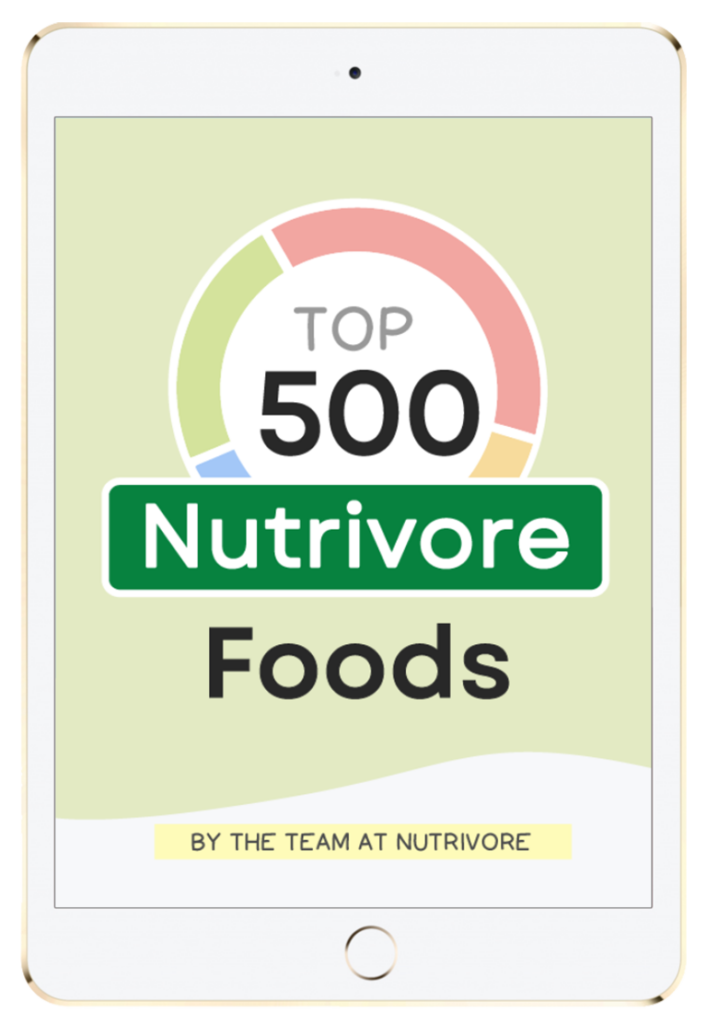
Top 500 Nutrivore Foods
The Top 500 Nutrivore Foods e-book is an amazing reference deck of the top 500 most nutrient-dense foods according to their Nutrivore Score. Think of it as the go-to resource for a super-nerd, to learn more and better understand which foods stand out, and why!
If you are looking for a quick-reference guide to help enhance your diet with nutrients, and dive into the details of your favorite foods, this book is your one-stop-shop!
Buy now for instant digital access.
How Much Ergothioneine Do We Need?
Currently, there’s no recommended daily intake established for ergothioneine, though clinical benefits appear to occur starting at 5 to 10 mg daily.
According to the Panel on Dietetic Products for European Food Safety Authority, the safe upper intake limits of ergothioneine are 2.82 mg per kg of body weight for infants, 3.39 mg per kg for small children, and 1.31 mg per kg for adults (including while pregnant or breastfeeding).
Nutrient Daily Values
Nutrition requirements and recommended nutrient intake for infants, children, adolescents, adults, mature adults, and pregnant and lactating individuals.
Best Food Sources of Ergothioneine
The following foods have high concentrations of ergothioneine, containing at least 1.13 milligrams per serving, making them our best food sources of this valuable amino acid!
Good Food Sources of Ergothioneine
The following foods are also excellent or good sources of ergothioneine, containing at least 0.23 milligrams (and up to 1.13 milligrams) of the daily value per serving.
Ditch Diets. Embrace Nutrients. Start with this FREE Guide.
Sign up for the free Nutrivore Newsletter, your weekly, science-backed guide to improving health through nutrient-rich foods — without dieting harder —and get the Beginner’s Guide to Nutrivore delivered straight to your inbox!

Citations
Expand to see all scientific references for this article.
Cheah, I. K., and Halliwell, B. 2021. “Ergothioneine, recent developments.” Redox biology, 42, 101868. doi: 10.1016/j.redox.2021.101868
Borodina, I., Kenny, L. C., McCarthy, C. M., Paramasivan, K., Pretorius, E., Roberts, T. J., van der Hoek, S. A., and Kell, D. B. 2020. “The biology of ergothioneine, an antioxidant nutraceutical.” Nutrition research reviews, 33(2), 190–217. doi: 10.1017/S0954422419000301
Smith, E., Ottosson, F., Hellstrand, S., Ericson, U., Orho-Melander, M., Fernandez, C., and Melander, O. 2020. “Ergothioneine is associated with reduced mortality and decreased risk of cardiovascular disease.” Heart (British Cardiac Society), 106(9), 691–697. doi: 10.1136/heartjnl-2019-315485
Kameda, M., Teruya, T., Yanagida, M., and Kondoh, H. 2020. “Frailty markers comprise blood metabolites involved in antioxidation, cognition, and mobility.” Proceedings of the National Academy of Sciences of the United States of America, 117(17), 9483–9489. doi: 10.1073/pnas.1920795117
Beelman, R. B., Kalaras, M. D., Phillips, A. T., and Richie, J. P., Jr 2020. “Is ergothioneine a ‘longevity vitamin’ limited in the American diet?.” Journal of nutritional science, 9, e52. doi: 10.1017/jns.2020.44



